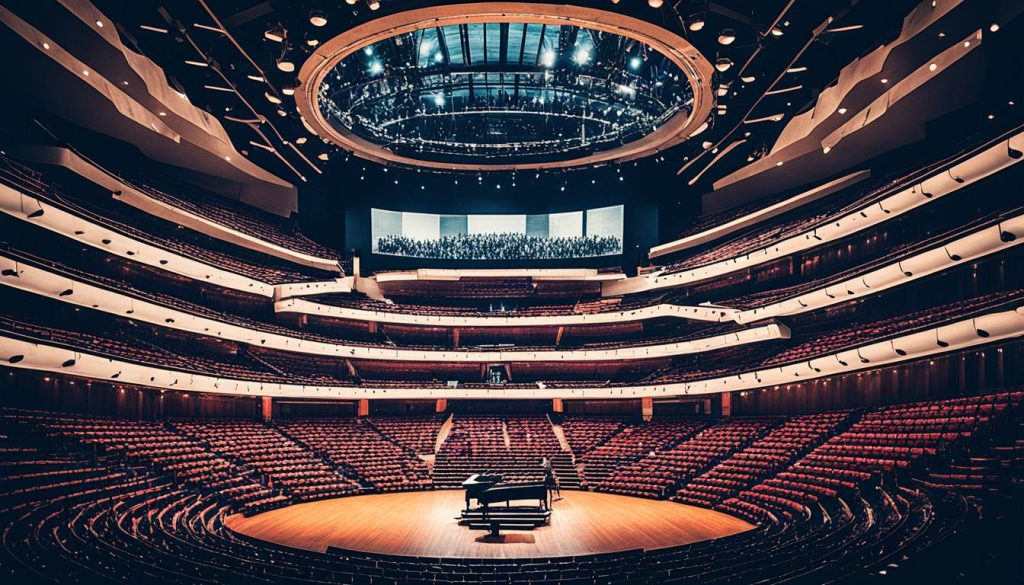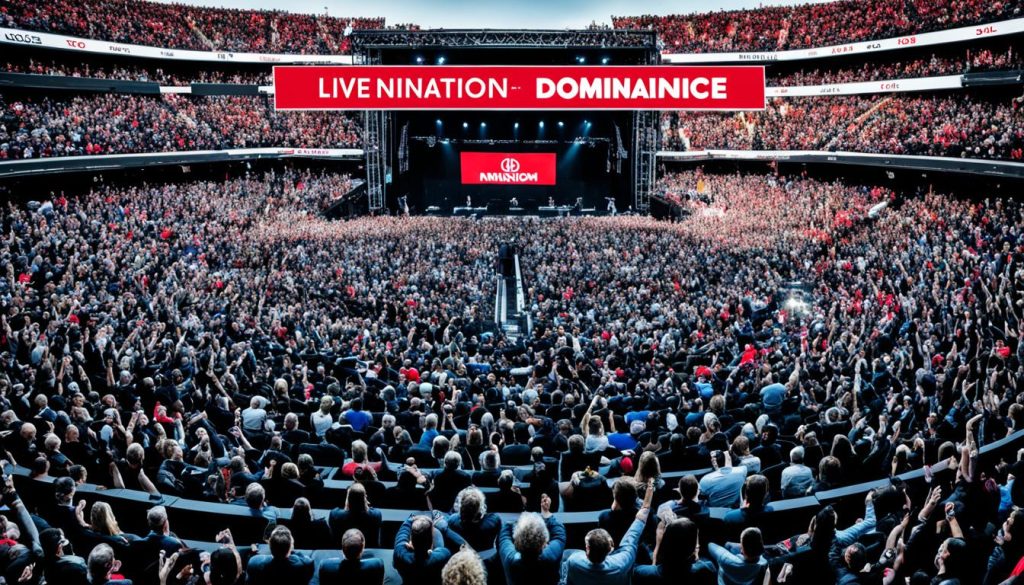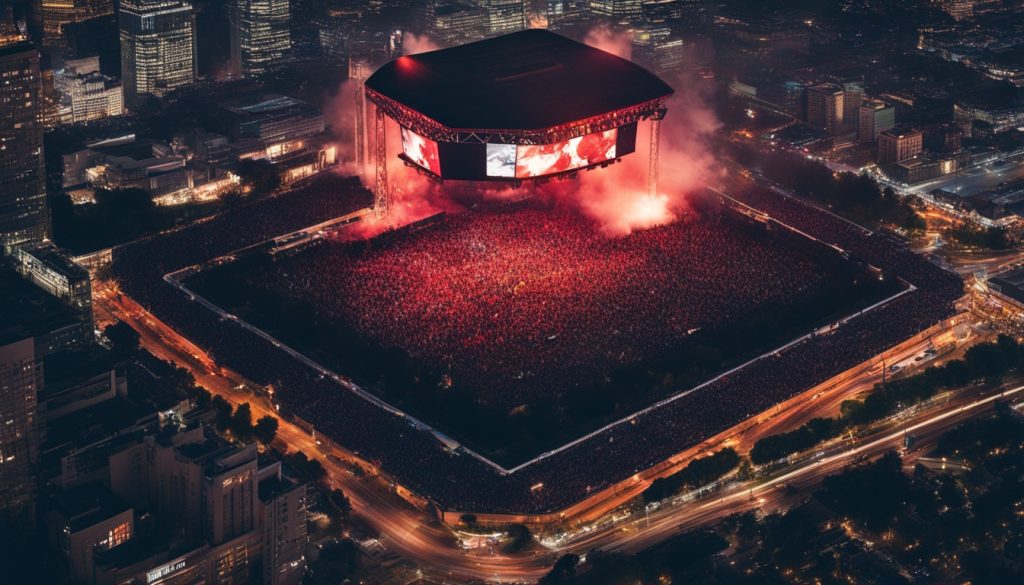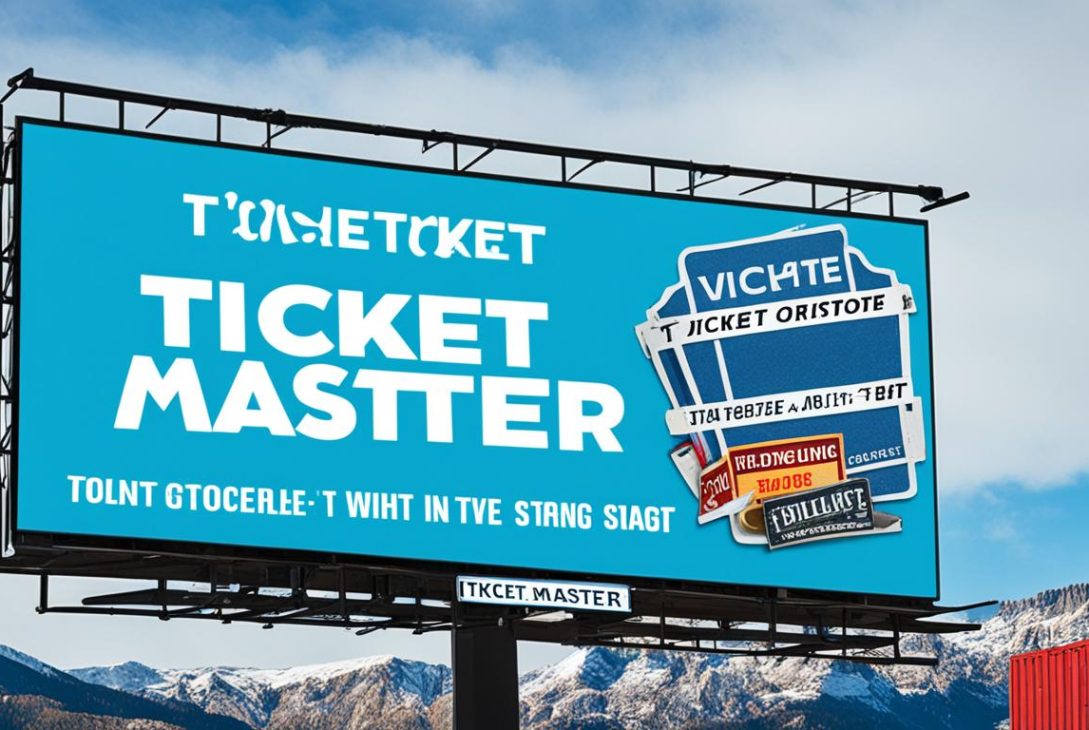The U.S. Justice Department, backed by over two dozen states, is taking on Live Nation Entertainment. This lawsuit aims to break Live Nation’s strong hold on the music market. It claims Live Nation and Ticketmaster raise ticket prices unfairly and hurt artists and rivals. The move aligns with President Biden’s push to encourage fair competition in all areas.
Attorney General Merrick Garland claims Live Nation is “suffocating its competition.” He says this leads to higher costs for fans and less chances for artists. Smaller music spots and event organizers also face difficulties because of this. The lawsuit wants to at least separate Live Nation from Ticketmaster to address these issues.
Live Nation holds about 60% of the live music show market in top venues and runs or influences over 265 event spaces across North America. With Ticketmaster, it dominates sales at big venues by about 80%, showing its huge control. After the lawsuit news, Live Nation’s stock fell by 8.3% on a Thursday afternoon.
In 2010, the Justice Department allowed Ticketmaster to merge with Live Nation but set rules to prevent unfair practices. This included a check-up period that was stretched to 2025 when Ticketmaster was found to punish arenas working with other ticket sellers. Now, the government says Live Nation is still acting in ways that block fair competition.
Key Takeaways
- The Justice Department joined by over two dozen states, has sued Live Nation to breakup its market dominance.
- The lawsuit argues that Live Nation and Ticketmaster have unlawfully inflated ticket prices and restricted competition.
- Live Nation owns or controls more than 265 concert venues and 60% of concert promotions at major venues.
- Ticketmaster controls around 80% of big venues’ primary ticketing, solidifying its market power.
- Live Nation’s shares dropped by 8.3% following the lawsuit announcement.
For more information on the lawsuit, click here.
Background on Live Nation and Ticketmaster Merger
In 2010, Live Nation and Ticketmaster joined forces. Many people were worried this might lead to a live nation ticketing monopoly. This got a lot of criticism from the public and politicians.
Recently, fans struggled to buy tickets for Taylor Swift’s tour. They faced high prices and poor service. This made people even more concerned about the merger. Some feel it’s causing unfair competition.
History of the 2010 Merger
In 2010, Live Nation bought Ticketmaster, a big ticket seller. The goal was to make selling tickets and organizing shows smoother. But some worried about a live nation market dominance.
The Department of Justice (DOJ) put rules on the merger. They wanted to protect competition. But there were doubts about if these rules were enough.
Conditions of the DOJ’s Approval
The DOJ made rules to keep competition fair. But by 2020, issues started showing up. It was said Ticketmaster was punishing places that used other ticket sellers.
Now, there’s a push to make Ticketmaster separate from the rest. This highlights Live Nation’s huge presence. They work with over 400 artists. And they control 60% of big concerts. Plus, they own or rule over 265 places where shows happen in North America.
Their Ticketmaster part also controls most tickets sold for big events. This fight aims to make the market more open and fair.
“The US Justice Department and more than two dozen states sued to break up Live Nation, alleging that the concert promoter and Ticketmaster unit illegally inflated concert ticket prices.”
All this has made a strong case against Live Nation’s big role. The court case could change a lot about how live events work.
US DOJ and States File Lawsuit Against Live Nation
The U.S. Department of Justice (DOJ) and some states are taking legal action against Live Nation. They want to break Live Nation’s strong hold on the live events market. The lawsuit says Live Nation is using unfair ways to keep its power, like controlling big concert venues. This stops others from competing fairly.
Details of the Legal Allegations
The live nation doj lawsuit argues that Live Nation is making it hard for others to compete. This helps Live Nation stay as the main player in the live events world. This makes it tough for others in the business and gives Live Nation too much control.
Comments from Attorney General Merrick Garland
Attorney General Merrick Garland is very critical of Live Nation’s actions. He says they are harmful to the industry, fans, and artists. Live Nation’s big influence means fans pay more and artists have fewer chances to perform. This shows the bad impact of Live Nation’s live nation monopoly on music in general.
In the legal case in New York’s Southern District Court, the government talks about how big Live Nation and Ticketmaster are. They claim these companies are unfair in the live events market. This is another part of their argument against Live Nation’s methods.
Market Impact of Live Nation’s Dominance
Live Nation dominates the live events scene. It controls over 60% of major concert promotions across North America. This includes more than 400 artists. They also own or hold a big share in 265+ concert venues. This makes their presence in the market very large.

Control Over Concert Ticket Sales
Live Nation’s reach is deepened through Ticketmaster. Ticketmaster holds a big position in selling tickets for major venues. In fact, over 80% of these venues are under its influence. This setup gives Live Nation a lot of power over ticket prices and how easily they can be bought. It’s very hard for other companies to join in.
Effect on Fans and Artists
With Live Nation in charge, fans and artists feel the impact. Fans have to deal with higher ticket costs and less choice. This is because Live Nation’s control over ticketing leads to these issues. Artists also face difficulties. They have fewer options to perform and their promotions are not as varied. Live Nation’s tight hold over the industry clearly has serious effects on everyone involved.
Live Nation ‘suffocates its competition,’ US says in monopoly lawsuit
Live Nation and the U.S. Justice Department are in a heated legal battle. The lawsuit alleges that Live Nation controls the live music industry entirely. This control supposedly stops competition, making the situation very serious.
Live Nation fights back by saying they’ve done a lot to better the music market. They sold over 620 million tickets last year, showing they are big players. They believe their success comes from giving great services and added value.
The Justice Department has a different view. They’re concerned about Live Nation’s big hold on the concert ticket market through Ticketmaster. With 70% of big venue tickets sold by them, there are worries about fair play and new ideas.
Live Nation has control over 265+ concert venues in North America and many top amphitheaters. From 2014 to 2023, its influence in the world’s venues grew by over 136%. This growth in power supports the DOJ’s claim of market domination.
The lawsuit seeks to dismantle the Live Nation-Ticketmaster hold to boost competition, new ideas, and lower costs. But Live Nation says the case won’t improve things for fans. How this argument affects the market is still uncertain.
| Control Metrics | Statistics |
|---|---|
| Tickets Distributed in 2023 | 620 million |
| Market Share for Major Concert Venues | 70% |
| Control over North American Venues | 265+ |
| Worldwide Venue Influence Growth (2014-2023) | 136% |
| DOJ Oversight Extension | Until 2025 |
Political Reactions to the Lawsuit
The fight against Live Nation has united many in politics, from both sides. It’s backed by 30 state attorneys general. They say the live events world is hurt by what seems like a controlling monopoly.
Senator Amy Klobuchar’s Statement
Senator Klobuchar fully supports fighting for fans. She explains how Live Nation broke deals not to punish venues for working with other ticket sellers. Due to these findings, she pushes for laws that make the field fairer. Now, Live Nation faces restrictions up to 2025.
Bipartisan Support for Antitrust Measures
Top legal officials from states like New York and Texas stand together. They understand the need to fight monopolies illegally controlling markets. The win against Live Nation might pave the way for other critical fights. Just like when the Justice Department took on companies like Apple for smartphone market monopolies.
Financial Implications for Live Nation
Recent legal battles have hit Live Nation’s wallet, showing big financial effects. The news of the lawsuit sent the company’s stock down by 8.3%. This quick stock market dip shows how worried investors are about Live Nation’s future earnings and business model.

Stock Market Reaction
The lawsuit’s start made Live Nation’s stock prices drop a lot, by 8.3%. It shows that investors and the market are scared of the lawsuit’s impact. The fall in stock prices shows how quickly rumors of a monopoly lawsuit can make investors lose faith and lower stock prices.
Analyst Opinions on the Lawsuit
Big names in finance, like Guggenheim Partners, still say “buy” on Live Nation. They believe the company is strong enough to handle the legal problems. Yet, other experts see the lawsuit as needed to make sure the live events market is fair.
| Aspect | Market Reaction |
|---|---|
| Stock Price Drop | 8.3% |
| Analyst Ratings | “Buy” by Guggenheim Partners |
| General Sentiment | Mixed – Concern + Potential Rebound |
The lawsuit on a live nation monopoly raises concerns, but it also shines a light on market competition issues and its effect on Live Nation’s finances.
Historical Complaints Against Ticketmaster
Ticketmaster has faced long-standing criticism for how it does business. The key issues? Ticket prices and availability. These challenges have stoked customer dissatisfaction, greatly impacting the events industry.
Issues with Ticket Pricing and Availability
The problems with Ticketmaster aren’t recent. Decades of complaints have showcased how it leads to high ticket prices and few tickets. With a virtual monopoly on around 70% of major concert venues’ ticket sales in the U.S., and control over 265 venues, it’s easy to see why.
High-Profile Incidents like Taylor Swift’s Tour
Recent events, like the Taylor Swift tour, have heightened public anger. During these ticket sales, fans faced high prices and ticket shortages, which didn’t help Ticketmaster’s image. These episodes raise concerns about the live nation ticketing monopoly and its impact on customers.
The growing critique and historical issues underscore the problem with Ticketmaster complaints. They also bring Live Nation’s strategies into question. With the Justice Department’s oversight extended to 2025, we might see more actions against antitrust and better market regulations.
| Year | Event | Tickets Sold | Complaints |
|---|---|---|---|
| 2019 | Live Nation Violates Agreement | 500 million | Retaliation Against Venues |
| 2023 | Ticketmaster Chaos During Taylor Swift’s Tour | 620 million | High Prices, Limited Availability |
Live Nation’s Defense Against Antitrust Allegations
Live Nation is fighting back against claims of antitrust violations. The company says the lawsuit won’t solve fans’ issues with ticket prices and availability. They argue that the live events market is naturally competitive. This means ticket prices and availability are set by this competition.
Live Nation is sure it will win against the lawsuit in court. They believe the Justice Department’s efforts are more about looking good than really helping fans. Alive and diverse market is what Live Nation keeps pointing to, defending their actions.
Live Nation points out how strong and healthy the live events sector is. They say their practices are all above board and foster competition. They claim the DOJ’s antitrust moves won’t really help fans but are more about gaining good public opinion.
Role of Smaller Promoters and Venue Operators in the Market
In a world largely shaped by Live Nation, smaller promoters and venue operators play a key role. They face tough challenges against the power in the industry. This power decides the opportunities and hurdles they come across.

Challenges Faced by Smaller Promoters
Smaller promoters have many hurdles to jump over in the current market. With Live Nation dominating about 60% of big venue shows and looking after more than 400 artists, it’s hard for them to get the resources they need. This control limits their success, making them work under a big player’s shadow.
Plus, Live Nation’s firm grip over ticket sales adds another layer of challenge. Close to 80% of tickets in big venues are sold with their Ticketmaster service. This makes it very hard for others to jump in, like smaller promoters and rival ticket companies.
Impact on Venue Operators
Smaller venue operators face a similar squeeze because of Live Nation. With control over 265 major concert spots, Live Nation often blocks their chance at great events. This situation cuts down their chances and sway on the market.
The ongoing DOJ lawsuit against Live Nation highlights these problems. It aims to make the market fairer and more lively for all players. Without this effort, the industry’s live events aspects could become less diverse and sustainable over time.
If you want more details on this important issue and what it means for the industry, check out the DOJ’s lawsuit against Live Nation.
Consequences for Concertgoers and Fans
The lawsuit against Live Nation is making big waves. It’s especially affecting concertgoers and fans. With over 60% of concert promotions and more than 265 venues in North America, Live Nation’s big. This means less competition, leading to higher prices and fewer tickets. So, many fans can’t enjoy as many concerts as they’d like.
But cost is just the start of it. The DOJ says Live Nation’s monopoly also harms the quality of the fan experience. When there’s less competition, there’s little need to make things better. This means fans miss out on new and improved ways to enjoy live music. Plus, they have fewer chances to interact with their favorite artists. Live Nation’s strong hold on the market is the reason behind this.
The lawsuit has wide support. Attorneys general from both sides are fighting alongside. They want to end the negative effects of the live nation monopoly. Their aim is to make the live events scene fairer and more vibrant by encouraging competition. They believe this will lead to better prices and services for fans.
Ticket sales through Ticketmaster are also under Live Nation’s thumb. Like big concerts, where they have around 80% control. This shows why fans are feeling these live nation impact. The DOJ is watching until 2025. They want to stop unfair practices and open up the market.
The Future of Concert Ticketing if Live Nation is broken up
As talks heat up about breaking up Live Nation, the future of concert ticketing stands at a crossroads. Experts and those in the industry are thinking about what might happen if Live Nation loses its big grip. How will things change if Live Nation’s role is shaken up?
Potential Market Changes
If Live Nation breaks up, more companies might fight for our concert ticket money. This would lead to a more lively market, with new tech making ticket buying better. Fans might see tickets get cheaper and services get better as these companies fight over them.
Breaking up with Live Nation could let smaller promoters have a fairer chance. Right now, it’s hard for smaller folks to compete because Live Nation is so big. With more companies in the mix, there might be less unfairness, and things could be more equal.
Expectations from Ticketing Companies
If Live Nation steps back, we’ll want a lot from other ticketing companies. Newcomers might focus on being super clear and fair with their costs. They could make buying tickets easier, setting a new bar for everyone.
The following table outlines anticipated market changes:
| Current Market | Post-Breakup Scenario |
|---|---|
| High Ticket Fees | Competitive Pricing |
| Limited Choices | Diverse Options |
| Poor Customer Service | Improved User Experience |
| Monopolistic Practices | Enhanced Market Equity |
In the end, the future of concert ticketing will depend on rules and how well the market can change. With more variety, shows could get better for everyone. Fans and professionals in the industry might both win, shaping a brighter live event scene.
Expert Opinions on Antitrust Lawsuits in the Entertainment Industry
The live nation antitrust lawsuit is a huge deal in the live entertainment world. It sparks serious discussions among experts and analysts. They debate its effects on the rules and the business side of things.
Legal Perspectives
Legal minds stress how vital it is to keep competition laws strict in entertainment. The live nation antitrust lawsuit is a key example. The Justice Department says Live Nation’s huge control, with 60% of shows and 265 venues, is too much. They see it unfair, especially since Ticketmaster, owned by Live Nation, owns 80% of primary ticketing. Such control points to the need for legal actions to promote fair play.
Industry Analysts’ Views
Market experts look at the lawsuit from a money and impact angle. While some see the DOJ’s case as serious, others like Guggenheim Partners think it’s “weak” and has political reasons. Still, when the lawsuit was announced, Live Nation’s stock fell by 8.3%. Opinions vary. Some believe the industry might break into smaller, better companies. But, others think the lawsuit won’t change much in the entertainment industry competition.
Experts in law and business all agree that the live nation antitrust lawsuit could deeply change how live events work in the future.
Conclusion
The case against Live Nation is a crucial moment in the live events world. It’s not just about tickets and concerts. It will also show how we deal with antitrust laws. Attorney General Merrick Garland is serious about Live Nation “suffocating its competition.” This pushback could change how ticket services work to be more fair.
This case’s impact will be big, reaching from big companies to fans like you. The Justice Department wants to bring more balance to the market. What Live Nation does next and the court’s decisions will shape how we buy tickets for events.
The industry is waiting to see how the law will be used in the future. If antitrust rules work well, it could mean a better chance for smaller promoters. Also, fans might see lower ticket prices and better service. This lawsuit is key to making the industry more fair and satisfying for its customers.
FAQ
What allegations has the US Justice Department made against Live Nation?
What historical context led to the lawsuit against Live Nation?
Why does the lawsuit seek to dismantle Live Nation’s control over the market?
How has Live Nation’s dominance impacted the market?
What has been the political response to the lawsuit?
What were some of the financial consequences for Live Nation following the announcement of the lawsuit?
What historical complaints have been made against Ticketmaster?
How has Live Nation responded to the antitrust allegations?
What challenges do smaller promoters and venue operators face due to Live Nation’s practices?
How have concertgoers and fans been affected by Live Nation’s market conduct?
What might the future of concert ticketing look like if Live Nation is mandated to divest Ticketmaster?
What are the key legal and industry perspectives on the antitrust lawsuits within the entertainment domain?
Source Links
Concert industry lawsuit Live Nation monopoly Music venue competition US antitrust
Last modified: May 23, 2024





